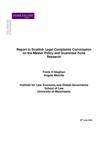SLCC research published
Research into Scottish solicitors' professional indemnity insurance was today (Monday 13 July) published by the Scottish Legal Complaints Commission.
The SLCC, which only opened for business on 1 October last year, was set up by the Scottish Government primarily to provide a modern complaints handling system enabling complaints against the legal profession to be resolved quickly and effectively.
SLCC Chair, Jane Irvine commented: "The Legal Profession and Legal Aid (Scotland) Act 2007 gives the SLCC its powers and these include oversight of the Law Society of Scotland's Master Policy and Guarantee Fund."
"The research was carried out by two internationally renowned researchers, Professor Frank Stephen and Dr Angela Melville from Manchester University School of Law and it is an excellent report and the first step towards enabling the SLCC to fulfil its oversight role."
"The research is unique as it is the first to examine how the Master Policy and Guarantee Fund function but we are very disappointed that conditions imposed on the data delivered by the Law Society of Scotland's broker, proved unacceptable and the transparency of operation, which is key for all users, is not apparent. Nevertheless, the report is still a valuable and important document."
The Master Policy is the compulsory Professional Indemnity Insurance which covers all Scottish solicitors working in private practice. Claims are handled by the Master Policy insurers and the insurance provides cover of up to £2 million for any one claim.
The Scottish Solicitors' Guarantee Fund protects those who have lost money because of the dishonesty of a solicitor or a member of their staff. It is a fund of last resort, which means it can only compensate those who have exhausted all other options, such as suing the solicitor for professional negligence. Payments are discretionary and all legal firms in Scotland contribute annually to the fund.
Eileen Masterman, SLCC Chief Executive continued: "The research is very much exploratory and this is due to the short time-span and the small number of claimants and solicitors it was possible to interview. It is a useful first step in providing the SLCC with a meaningful insight into the Master Policy and Guarantee Fund and how it can affect complainers."
"Members of the SLCC Board will now benefit from this important first-stage research which will develop our role overseeing the Master Policy and Guarantee Fund."
